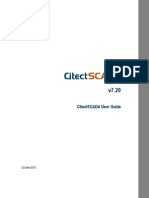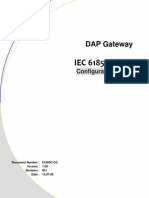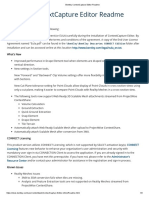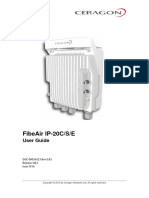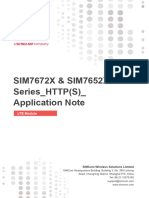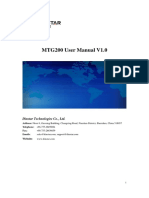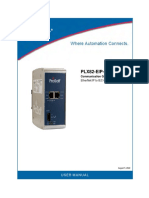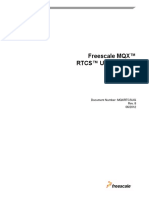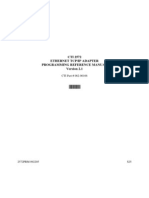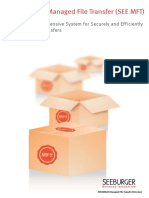Unity Fastlinx User Documentation
Uploaded by
Ganiza LongUnity Fastlinx User Documentation
Uploaded by
Ganiza LongCitect Pty Ltd ABN 88 001 158 854 3 Fitzsimons Lane Gordon 2072 NSW Australia PO Box 174
Pymble 2073 NSW Australia Tel 61 2 9496 7300 Fax 61 2 9496 7399 www.citect.com
Unity FastLinx
User Documentation
Revision 2.0
User Documentation
Contents
1. Introduction ............................................................................................................................2 2. System Requirements ............................................................................................................3 3. Configuring a Linked I/O Device ........................................................................................4 4. Synchronisation Rules ..........................................................................................................10 4.1 OPC Protocol Specific.........................................................................................10 4.2 Unite, Modnet, Modbus, MBPlus Protocol Drivers ...........................................17
Citect Pty Ltd
User Documentation
1. Introduction
The Unity FastLinx product provides the ability to seamlessly integrate tag management between the Schneider Unity Pro tag configuration platform and the CitectSCADA tag configuration system. This allows for the management of tags to be performed from either the CitectSCADA system, Unity Pro or both with each side being maintained in a synchronised state. The Unity FastLinx product also allows the import and export of tags from the CitectSCADA system to Unity Pro or from Unity Pro to the CitectSCADA system. The native Unity .STU file format is supported as well as the .XEF and .XSY XML Unity XML file formats.
Citect Pty Ltd
User Documentation
2. System Requirements
Software CitectSCADA v5.5 Service Pack B (CitectSCADA v6.0 recommended) Unity Pro XL 1.0 (Unity Pro 2.0.2 recommended) NOTE Unity Pro S/M is not supported Operating System Windows XP Service Pack 1, Windows 2000 Service Pack3, Windows 2003 Server (not fully tested), Windows NT not supported Hardware Pentium 500 MHz, 256Mb RAM, 50Mb free HD (Pentium 2GHz, 512 Mb RAM, 256Mb free HD recommended)
Citect Pty Ltd
User Documentation
3. Configuring a Linked I/O Device
An I/O device may be linked either through the Express Wizard or via the I/O devices form. To configure the device via the Express Wizard go to the Express Wizard via the CitectSCADA Explorer Window.
Figure 1, Selecting Express Wizard via the CitectSCADA Explorer window.
Click on and the Express Wizard will be invoked. Alternatively the Express Wizard can be invoked via the CitectSCADA Editor Window through the Communication drop down box.
Figure 2, Selecting Express Wizard via the CitectSCADA Editor Window The following welcome screen for the Express Wizard will be displayed.
Citect Pty Ltd
User Documentation
Figure 3, Express Wizard welcome screen.
Click on
to proceed to the I/O Server selection screen.
Figure 4, Express Wizard I/O Server selection screen. Select or create the I/O Server containing the I/O Device you wish to link to and click to proceed to the I/O Device selection screen.
Citect Pty Ltd
User Documentation
Figure 5, Express Wizard I/O Device selection screen.
Select or create the I/O device and click selection screen.
to proceed to the I/O Device type
Figure 6, Express Wizard I/O Device type selection. Select External I/O Device and click to continue to the protocol driver selection screen.
Citect Pty Ltd
User Documentation
Figure 7, Express Wizard protocol driver selection screen.
Click on
to proceed to the specific protocol driver configuration and then click to get to the Express Wizard link screen.
Figure 8, Express Wizard Link screen. Select the Link I/O Device box, Drop down the Database Type and select either Unity FastLinx Dynamic for the live synchronisation mode or Unity FastLinx Static for the XML based import/export mode.
Citect Pty Ltd
User Documentation
Click on the to bring up the Unit FastLinx Link configuration dialog. The following dialog will be displayed.
Figure 9, Unity FastLinx Link Configuration. The following is a description of the fields. Project File The .STU file for the Unity Pro project to link with. To get access to a network location this should be a UNC path. XML File The XML file to import from or export to when in Static mode. Unity Profile (Not currently supported)
Citect Pty Ltd
User Documentation
DCOM Server Name The name of the server running the Unity Pro application. DCOM User Name The name of the user to run the DCOM component under. Needs to be of the following format <Domain>\<User Name>. DCOM Password The password of the above user. Protocol Driver The driver protocol selected in the I/O device form in CitectSCADA. This will be selected automatically in CitectSCADA v6.0 and above. Logging (Not currently supported)
Citect Pty Ltd
User Documentation
4. Synchronisation Rules
4.1 OPC Protocol Specific
The following is the behaviour for synchronisation when using the CitectSCADA OPC protocol driver based tags. With this protocol the CitectSCADA tag address is the Unity Tag name. The CitectSCADA tag name is purely an alias for the CitectSCADA project and does not need to match the Unity tag name. Tag names in CitectSCADA and Unity must be unique. Where there are duplicate address values in CitectSCADA these tag variables will be excluded from the synchronization process. The duplicate tag variables will be clearly set out in the transaction log. The duplicate tag variables will therefore be left in CitectSCADA, maintaining the same information prior to synchronization. Any changes to the Schneider tag variable will not be applied to the duplicate tag variables, and will not be maintained.
4.1.1 Creating a new tag in Unity Pro
A new tag created in Unity Pro will subsequently be created in CitectSCADA. The Unity Pro tag address will not be accessible from CitectSCADA. The Unity Pro tag name will be the CitectSCADA tag address and used as the suggested initial. Scenario : Variable does not exist as a tag name or address in CitectSCADA Addition CitectSCADA Name Address
Type
Comment
REF
Schneider Name Address
SC_TAG1 INT
Type
%MW10
Comment
Schneider Tag 1
Result
SC_TAG1 INT SC_TAG1 Schneider Tag 1 SC_TAG1 INT %MW10 Schneider Tag 1
Scenario : Variable exists as a tag name in CitectSCADA in the same IO device but not a tag address Starting State CitectSCADA Name Address
SC_TAG1 SC_TAG0
Type
REAL
Comment
Schneider Tag 0
REF
Schneider Name Address
SC_TAG0 REAL
Type
%MW10
Comment
Schneider Tag 0
Change
SC_TAG1 INT %MW120 Schneider Tag 1
Result This situation will cause a synchronisation error to occur The CitectSCADA framework will not allow the addition of the duplicate tag in CitectSCADA. The user is notified via the log file.
SC_TAG1 SC_TAG0 REAL Schneider Tag 0 SC_TAG0 REAL %MW10 Schneider Tag 0
Citect Pty Ltd
10
User Documentation
SC_TAG1
INT
%MW120
Schneider Tag 1
Scenario : Variable exists as a tag name in CitectSCADA in a different IO device but not a tag address Starting State CitectSCADA Name Address
SC_TAG1 SC_TAG0
Type
REAL
Comment
Schneider Tag 0
REF
Schneider Name Address
SC_TAG0 REAL
Type
%MW10
Comment
Schneider Tag 0
Change
SC_TAG1 INT %MW120 Schneider Tag 1
Result This situation will not cause a synchronisation error The CitectSCADA framework will allow the addition of the duplicate tag in CitectSCADA. The user is notified on the next compile of the project. Need to use tag prefix.
SC_TAG1 SC_TAG1 SC_TAG0 SC_TAG1 REAL INT Schneider Tag 0 Schneider Tag 1 %MW10 %MW120 SC_TAG0 SC_TAG1 REAL INT %MW10 %MW120 Schneider Tag 0 Schneider Tag 1
4.1.2 Creating a new tag in CitectSCADA
A new tag created in CitectSCADA will subsequently be created in Unity Pro. The Unity Pro tag name will be the CitectSCADA tag address. The Unity Pro tag will be unlocated. Scenario : Variable does not already exist in Schneider (Name = Address) Addition CitectSCADA Name Address
SC_TAG1 SC_TAG1
Type
REAL
Comment
Citect Tag 1
REF
Schneider Name Address
Type
Comment
Result
SC_TAG1 SC_TAG1 REAL Citect Tag 1 SC_TAG1 Unlocated REAL Citect Tag 1
Scenario : Variable does not already exist in Schneider (Name != Address) Addition CitectSCADA Name Address
CI_TAG1 SC_TAG1
Type
REAL
Comment
Citect Tag 1
REF
Schneider Name Address
Type
Comment
Result
CI_TAG1 SC_TAG1 REAL Citect Tag 1 SC_TAG1 Unlocated REAL Citect Tag 1
Citect Pty Ltd
11
User Documentation
Scenario : Exists in CitectSCADA as tag name but not as address Starting State CitectSCADA Name Address
CI_TAG1 SC_TAG1
Type
REAL
Comment
Citect Tag 1
REF
%MW20
Schneider Name Address
SC_TAG1 %MW20
Type
REAL
Comment
Citect Tag 1
Addition
CI_TAG2 CI_TAG1 INT Citect Tag 2
Result
CI_TAG1 CI_TAG2 SC_TAG1 CI_TAG1 REAL INT Citect Tag 1 Citect Tag 2 %MW20 SC_TAG1 CI_TAG1 %MW20 Unlocated REAL INT Citect 1 Citect 2 Tag Tag
4.1.3 Deleting a tag in Unity Pro
A tag deleted in Unity Pro will subsequently deleted in CitectSCADA. The tag deleted from CitectSCADA will be the one with its tag address the same as the Unity Pro tag name. This behaviour will be configurable allowing the deleting of tags in CitectSCADA to be enabled or disabled. When disabled a subsequent synchronisation may create the tag in Unity Pro again. Scenario : CitectSCADA name and CitectSCADA Address is Identical Starting State CitectSCADA Name Address
CI_TAG1 CI_TAG1
Type
INT
Comment
Citect Tag 1
REF
%MW20
Schneider Name Address
CI_TAG1 %MW20
Type
REAL
Comment
Citect Tag 1
Deletion
CI_TAG1 CI_TAG1 INT Citect Tag 1 %MW20
Result
%mw20
Scenario : CitectSCADA name and address is not identical Starting State CitectSCADA Name Address
CI_TAG1 CI_TAG2 SC_TAG1 CI_TAG1
Type
REAL INT
Comment
Citect Tag 1 Citect Tag 2
REF
%MW20 %MW30
Schneider Name Address
SC_TAG1 CI_TAG1 %MW20 %MW30
Type
REAL INT
Comment
Citect Tag 1 Citect Tag 2
Deletion
CI_TAG1 SC_TAG1 REAL Citect Tag 1 %MW20
Citect Pty Ltd
12
User Documentation
Result
CI_TAG2 CI_TAG1 INT Citect Tag 2 %MW30 CI_TAG1 %MW30 INT Citect Tag 2
4.1.4 Deleting a tag in CitectSCADA
A tag deleted in CitectSCADA will subsequently deleted in Unity Pro. The tag deleted from Unity Pro will be the one with its tag name the same as the CitectSCADA tag address. This behaviour will be configurable allowing the deleting of tags in Unity Pro to be enabled or disabled. When disabled a subsequent synchronisation may create the tag in CitectSCADA again. Scenario : CitectSCADA name and CitectSCADA address are Identical Starting State CitectSCADA Name Address
CI_TAG1 CI_TAG1
Type
INT
Comment
Citect Tag 1
REF
%MW20
Schneider Name Address
CI_TAG1 %MW20
Type
REAL
Comment
Citect Tag 1
Deletion
CI_TAG1 CI_TAG1 INT Citect Tag 1 %MW20 CI_TAG1 %MW20 REAL Citect Tag 1
Result
%mw20
Scenario : CitectSCADA name and CitectSCADA address not identical Starting State CitectSCADA Name Address
CI_TAG1 CI_TAG2 SC_TAG1 CI_TAG1
Type
REAL INT
Comment
Citect Tag 1 Citect Tag 2
REF
%MW20 %MW30
Schneider Name Address
SC_TAG1 CI_TAG1 %MW20 %MW30
Type
REAL INT
Comment
Citect Tag 1 Citect Tag 2
Deletion
CI_TAG1 CI_TAG2 SC_TAG1 CI_TAG1 REAL INT Citect Tag 1 Citect Tag 2 %MW20 %MW30 SC_TAG1 CI_TAG1 %MW20 %MW30 REAL INT Citect Tag 1 Citect Tag 2
Result
CI_TAG2 CI_TAG1 INT Citect Tag 2 %MW30 CI_TAG1 %MW30 INT Citect Tag 2
4.1.5 Updating tag type in Unity Pro
A tag type updated in Unity Pro will subsequently be updated in CitectSCADA. The tag updated in CitectSCADA will be the one with its tag address the same as the Unity Pro tag name.
Scenario
Starting State CitectSCADA Name Address Schneider Name Address
Type
Comment
REF
Type
Comment
Citect Pty Ltd
13
User Documentation
CI_TAG1
SC_TAG1
DIGITAL
Citect Tag 1
%M10
SC_TAG1
%M10
DIGITAL
Citect Tag 1
Change
CI_TAG1 SC_TAG1 INT Citect Tag 1 %M10
Result Change not accepted, user is notified via log file
CI_TAG1 SC_TAG1 DIGITAL Citect Tag 1 %M10 SC_TAG1 %M10 DIGITAL Citect 1 Tag
4.1.6 Updating tag type in CitectSCADA
The tag type will not be modifiable in CitectSCADA as many type changes require the physical address to also be updated.
4.1.7 Updating tag comment in Unity Pro
The tag comment updated in Unity Pro will subsequently be updated in CitectSCADA. The tag updated in CitectSCADA will be the one with its tag address the same as the Unity Pro tag name.
4.1.8 Updating tag comment in CitectSCADA
The tag comment updated in CitectSCADA will subsequently be updated in Unity Pro. The tag updated in Unity Pro will be the one with its tag name the same as the CitectSCADA tag address.
4.1.9 Updating tag name in Unity Pro
The tag name updated in Unity Pro will subsequently be updated in CitectSCADA. The CitectSCADA tag address will be updated to the new Unity Pro tag name.
4.1.10 Updating tag name in CitectSCADA
The tag name updated in CitectSCADA will result in no synchronisation activity. Scenario : Name changed to a tag name that does not already exist in CitectSCADA Starting State CitectSCADA Name Address
CI_TAG1 SC_TAG1
Type
INT
Comment
Citect Tag 1
REF
%MW10
Schneider Name Address
SC_TAG1 %MW10
Type
INT
Comment
Citect Tag 1
Change
NEW_TAG SC_TAG1 INT Citect Tag 1
Result
NEW_TAG SC_TAG1 INT Citect Tag 1 %MW10 SC_TAG1 %MW10 INT Citect Tag 1
Scenario : Name changed to a tag name that already exists in CitectSCADA Starting State CitectSCADA
Schneider
Citect Pty Ltd
14
User Documentation
Name
CI_TAG1 NEW_TAG
Address
SC_TAG1 SC_TAG2
Type
INT REAL
Comment
Citect Tag 1 Citect Tag 2
REF
%MW10 %MW20
Name
SC_TAG1 SC_TAG2
Address
%MW10 %MW20
Type
INT REAL
Comment
Citect Tag 1 Citect Tag 2
Change
NEW_TAG SC_TAG1 INT Citect Tag 1 %MW10
Result - Outside the scope of FastLinx. This result will not be allowed by the CitectSCADA frame work. A snapshot on the CitectSCADA side will help define that as an error and will require the user to solve the issue before synchronisation.
NEW_TAG NEW_TAG SC_TAG1 SC_TAG2 INT REAL Citect Tag 1 Citect Tag 2 %MW10 %MW20 SC_TAG1 SC_TAG2 %MW10 %MW20 INT REAL Citect 1 Citect 2 Tag Tag
4.1.11 Updating a tag address in Unity Pro
No visible updates will be made to the CitectSCADA tag
4.1.12 Updating a tag address in CitectSCADA
The change of address will either cause the CitectSCADA tag to link to an existing Unity Pro tag with the same tag name as the CitectSCADA tag address or a new Unity Pro tag will be created unlocated with the CitectSCADA tag address as the Unity Pro tag name
4.1.13 Updating a tag in CitectSCADA and Unity Pro
A simultaneous modification to a tag in both CitectSCADA and Unity Pro will result in the tag being updated with the Unity Pro changes and the CitectSCADA changes being ignored.
4.1.14 Updating a tag in CitectSCADA and Deleting in Unity Pro
A simultaneous update to a tag in CitectSCADA and a delete in Unity Pro will result in the tag being deleted from CitectSCADA and the CitectSCADA changes being ignored.
4.1.15 Updating a tag in Unity Pro and Deleting in CitectSCADA
A simultaneous update to a tag in Unity Pro and a delete in CitectSCADA will result in the tag being deleted from Unity Pro and the Unity Pro changes being ignored.
4.1.16 New OPC Tag Originating in CitectSCADA
CitectSCADA Address <tagname> <tagname> <tagname> <tagname> <tagname> <tagname> <tagname> CitectSCADA Type DIGITAL INT UINT LONG REAL BYTE STRING Unity Pro Tag Name <tagname> <tagname> <tagname> <tagname> <tagname> <tagname> <tagname> Unity Pro Address Unlocated Unlocated Unlocated Unlocated Unlocated Unlocated Unlocated Unity Pro Type EBOOL INT UINT DINT REAL BYTE STRING[255] Ranges
N/A N/A
Citect Pty Ltd
15
User Documentation
4.1.17 New OPC Tag Originating in Unity
Unity Pro Tag Name <tagname> <tagname> <tagname> <tagname> <tagname> <tagname> <tagname> <tagname> <tagname> <tagname> <tagname> <tagname> <tagname> <tagname> <tagname> <tagname> <tagname> <tagname> <tagname> <tagname> <tagname> <tagname> <tagname> <tagname> <tagname> <tagname> <tagname> <tagname> <tagname> <tagname> <tagname> <tagname> <tagname> <tagname> <tagname> <tagname> <tagname> <tagname> Unity Pro Address %M %MW %MW %MW %MW %MD %MB %MF %I %IW %IW %IW %IW %ID %IB %IF %KW %KW %KW %KW %KD %KB %KF %S %SW %SW %SW %SW %SD %SB %SF %Q %QW %QW %QW %QW %QD %QF Unity Pro Type EBOOL INT UINT BOOL (bit access) DINT DINT BYTE REAL EBOOL INT UINT BOOL (bit access) DINT DINT BYTE REAL INT UINT BOOL (bit access) DINT DINT BYTE REAL EBOOL INT UINT BOOL (bit access) DINT DINT BYTE REAL EBOOL INT UINT BOOL (bit access) DINT DINT REAL CitectSCADA Address <tagname> <tagname> <tagname> <tagname> <tagname> <tagname> %MBn <tagname> <tagname> <tagname> <tagname> <tagname> <tagname> <tagname> %MBn <tagname> <tagname> <tagname> <tagname> <tagname> <tagname> %MBn <tagname> <tagname> <tagname> <tagname> <tagname> <tagname> <tagname> %MBn <tagname> <tagname> <tagname> <tagname> <tagname> <tagname> <tagname> <tagname> CitectSCA DA Type DIGITAL INT UINT DIGITAL LONG LONG BYTE REAL DIGITAL INT UINT DIGITAL LONG LONG BYTE REAL INT UINT DIGITAL LONG LONG BYTE REAL DIGITAL INT UINT DIGITAL LONG LONG BYTE REAL DIGITAL INT UINT DIGITAL LONG LONG REAL Ranges / Comments
Citect Pty Ltd
16
User Documentation
<tagname> <tagname> <tagname> <tagname> <tagname> <tagname> <tagname> <tagname>
%QB %NW %NW %NW %CH %CH %MW, %KW %MW, %KW
BYTE INT UINT BOOL (bit access) INT UINT STRING[2x] STRING
<tagname> <tagname> <tagname> <tagname> <tagname> <tagname> <tagname> <tagname>
BYTE INT UINT DIGITAL INT UINT STRING STRING x 1 127 internal length of 16 is preserved TIME type is preserved DATE type is preserved TOD type is preserved DT type is preserved
<tagname> <tagname> <tagname> <tagname>
%MW, %KW %MW, %KW %MW, %KW %MW, %KW
TIME DATE TOD DT
<tagname> <tagname> <tagname> <tagname>!A[2]
LONG LONG LONG LONG
4.1.18 Array Support
Arrays are supported for all types except for DT tags and STRING/STRING[x] tags. Arrays in CitectSCADA are denoted by a suffix of !A[x], where x is the dimension of the arrays. Only zero based arrays are supported. For example Unity Tag : Fred %MW4 ARRAY [0..9] OF LONG CitectSCADA Tag : FredTag Fred!A[10] LONG CitectSCADA arrays are limited to no more than 256 bytes of data, ie 32 bit types 16 bit types 8 bit types 1 bit types have a maximum of 64 elements, have a maximum of 128 elements, have a maximum of 256 elements, have a maximum of 2048 elements
4.2 Unite, Modnet, Modbus, MBPlus Protocol Drivers
The following is the behaviour for synchronisation when using CitectSCADA Unite, Modnet, Modbus and MBPlus protocol driver based tags. With these protocols the CitectSCADA tag name is the Unity Tag name. Tag names in CitectSCADA and Unity must be unique. The FastLinx Framework prefix feature can be used to assist in keeping tag names unique.
4.2.1 Creating a new tag in Unity Pro
A new tag created in Unity Pro will subsequently be created in CitectSCADA.
4.2.2 Creating a new tag in CitectSCADA
Citect Pty Ltd
17
User Documentation
A new tag created in CitectSCADA will subsequently be created in Unity Pro. The Unity Pro tag name will be the CitectSCADA tag name. The Unity Pro tag will be unlocated.
4.2.3 Deleting a tag in Unity Pro
A tag deleted in Unity Pro will subsequently deleted in CitectSCADA. The tag deleted from CitectSCADA will be the one with its tag name the same as the Unity Pro tag name. This behaviour will be configurable allowing the deleting of tags in CitectSCADA to be enabled or disabled. When disabled a subsequent synchronisation may create the tag in Unity Pro again.
4.2.4 Deleting a tag in CitectSCADA
A tag deleted in CitectSCADA will subsequently deleted in Unity Pro. The tag deleted from Unity Pro will be the one with its tag name the same as the CitectSCADA tag name. This behaviour will be configurable allowing the deleting of tags in Unity Pro to be enabled or disabled. When disabled a subsequent synchronisation may create the tag in CitectSCADA again.
4.2.5 Updating tag type in Unity Pro
A tag type updated in Unity Pro will subsequently be updated in CitectSCADA. The tag updated in CitectSCADA will be the one with its tag name the same as the Unity Pro tag name.
4.2.6 Updating tag type in CitectSCADA
A tag type updated in CitectSCADA will subsequently be updated in Unity Pro. The tag updated in Unity Pro will be the one with its tag name the same as the CitectSCADA tag name.
4.2.7 Updating tag comment in Unity Pro
The tag comment updated in Unity Pro will subsequently be updated in CitectSCADA. The tag updated in CitectSCADA will be the one with its tag name the same as the Unity Pro tag name.
4.2.8 Updating tag comment in CitectSCADA
The tag comment updated in CitectSCADA will subsequently be updated in Unity Pro. The tag updated in Unity Pro will be the one with its tag name the same as the CitectSCADA tag name.
4.2.9 Updating tag name in Unity Pro
The tag name updated in Unity Pro will subsequently be updated in CitectSCADA. The CitectSCADA tag name will be updated to the new Unity Pro tag name.
4.2.10 Updating tag name in CitectSCADA
The tag name updated in CitectSCADA will subsequently be updated in Unity Pro. The Unity Pro tag name will be updated to the new CitectSCADA tag name.
4.2.11 Updating a tag address in Unity Pro
The tag address updated in Unity Pro will subsequently be updated in CitectSCADA. The CitectSCADA tag address will be updated to the new Unity Pro tag address.
Citect Pty Ltd
18
User Documentation
4.2.12 Updating a tag address in CitectSCADA
The tag address updated in CitectSCADA will subsequently be updated in Unity Pro. The Unity Pro tag address will be updated to the new CitectSCADA tag address.
4.2.13 Updating a tag in CitectSCADA and Unity Pro
A simultaneous modification to a tag in both CitectSCADA and Unity Pro will result in the tag being updated with the Unity Pro changes and the CitectSCADA changes being ignored.
4.2.14 Updating a tag in CitectSCADA and Deleting in Unity Pro
A simultaneous update to a tag in CitectSCADA and a delete in Unity Pro will result in the tag being deleted from CitectSCADA and the CitectSCADA changes being ignored.
4.2.15 Updating a tag in Unity Pro and Deleting in CitectSCADA
A simultaneous update to a tag in Unity Pro and a delete in CitectSCADA will result in the tag being deleted from Unity Pro and the Unity Pro changes being ignored.
4.2.16 New Unite Tag Originating in CitectSCADA
CitectSCADA Format %Mn %Sn %Ix.y.z %Qx.y.z %MWn:b %MDWn:b %MDn:b %KWn:b %SWn:b %MBn %NWi.j:k %NWi.j:k CitectSCADA Type DIGITAL DIGITAL DIGITAL DIGITAL DIGITAL DIGITAL DIGITAL DIGITAL DIGITAL BYTE INT UINT Unity Pro Format %Mn %Sn %Ix.y.z %Qx.y.z %MWn.b %MWn.b %MWn.b %KWn.b %SWn.b %MWn %NWi.j.k %NWi.j.k Unity Type EBOOL EBOOL EBOOL EBOOL BOOL BOOL BOOL BOOL BOOL BYTE INT UINT Pro Ranges n 0 - 65535 n 0 - 65535 x 0- 99 : y 0 99 : z 0 999 x 0- 99 : y 0 99 : z 0 999 n 0 65535 : b 1 - 16 n 0 65535 : b 1 - 16 n 0 65535 : b 1 - 16 n 0 65535 : b 1 - 16 n 0 65535 : b 1 - 16 n 0 65534 (n is even) i 0 127 : j 0 63 : k 0 63 i 0 127 : j 0 63 : k 0 63 n 0 65535 n 0 65535 x 0- 99 : y 0 99 : z 0 999 x 0- 99 : y 0 99 : z 0 999 x 0- 99 : y 0 99 : z 0 999
%SWn %SWn %IWx.y.z %IWx.y.z
INT UINT INT UINT
%SWn %SWn %IWx.y.z %IWx.y.z
INT UINT INT UINT
%QWx.y.z
INT
%QWx.y.z
INT
Citect Pty Ltd
19
User Documentation
%QWx.y.z
UINT
%QWx.y.z
UINT
x 0- 99 : y 0 99 : z 0 999 n 0 65535 n 0 65535 n 0 32767 : x 0 - 127 n 0 65535 n 0 65535 n 0 65535 n 0 - 65535 n 0 - 65535 n 0 65535 n 0 65535 n 0 32767 : x 0 - 127 n 0 65535 n 0 - 65535 n 0 - 65535 n 0 - 65535
%MWn %MWn %MWn[x] %MWn[8] %MDWn %MDn %MFn %MDFn %KWn %KWn %KWn[x] %KWn[8] %KDWn %KDn %SDWn
INT UINT STRING STRING LONG LONG REAL REAL INT UINT STRING STRING LONG LONG LONG
%MWn %MWn %MWn %MWn %MWn %MWn %MWn %MWn %KWn %KWn %KWn %KWn %KWn %KWn %SDn
INT UINT STRING[2x] STRING DINT DINT REAL REAL INT UINT STRING[2x] STRING DINT DINT DINT
4.2.17 New Unite Tag Originating in Unity
Unity Format %Mn %Sn %Ix.y.z %Qx.y.z %MWn.b %KWn.b %SWn.b %IWx.y.z %IWx.y.z Pro Unity Pro Type EBOOL EBOOL EBOOL EBOOL BOOL BOOL BOOL INT UINT CitectSCADA Format %Mn %Sn %Ix.y.z %Qx.y.z %MWn:b %KWn:b %SWn:b %IWx.y.z %IWx.y.z CitectSCADA Type DIGITAL DIGITAL DIGITAL DIGITAL DIGITAL DIGITAL DIGITAL INT UINT Ranges n 0 - 65535 n 0 - 65535 x 0- 99 : y 0 99 : z 0 999 x 0- 99 : y 0 99 : z 0 999 n 0 65535 : b 0 - 15 n 0 65535 : b 0 - 15 n 0 65535 : b 0 - 15 x 0- 99 : y 0 99 : z 0 999 x 0- 99 : y 0 99 : z 0 999 x 0- 99 : y 0 99 : z 0 999 x 0- 99 : y 0 99 : z 0 999 i 0 127 : j 0 63 : k 0 -
%QWx.y.z %QWx.y.z
INT UINT
%QWx.y.z %QWx.y.z
INT UINT
%NWi.j.k
INT
%NWi.j:k
INT
Citect Pty Ltd
20
User Documentation
%NWi.j.k
UINT
%NWi.j:k
UINT
63 i 0 127 : j 0 63 : k 0 63 n 0 65535 n 0 65535 n 0 65535 n 0 65535 n 0 65535 n 0 65535 n 0 65535 n 0 65535 n 0 65535 n 0 65535 n 0 65535 n 0 65535 n 0 65535 n 0 65535 n 0 65535 n 0 32767: x 0-127 n 0 65535 n 0 65535 n 0 65535 n 0 65535 n 0 65535 n 0 65535 n 0 65535 n 0 65535 n 0 65535 n 0 65535 n 0 65535 n 0 32767: x 0-127 n 0 65535
%SWn %SWn %SWn %MWn %MWn %MWn %MWn %MWn %MWn %MWn %MWn %MWn %MWn %MWn %MWn %MWn %MWn %KWn %KWn %KWn %KWn %KWn %KWn %KWn %KWn %KWn %KWn %KWn %KWn
INT UINT DINT INT BYTE UINT DINT UDINT WORD DWORD REAL TIME TOD DATE DT STRING[2x] STRING INT UINT DINT UDINT WORD DWORD TIME TOD DATE DT STRING[2x] STRING
%SWn %SWn %SDWn %MWn %MBn %MWn %MDWn %MDWn %MWn %MDWn %MFn %MDWn %MDWn %MDWn %MDWn[2] %MWn[x] %MWn[8] %KWn %KWn %KDWn %KDWn %KWn %KDWn %KDWn %KDWn %KDWn %KDWn[2] %KWn[x] %KWn[8]
INT UINT LONG INT BYTE UINT LONG LONG UINT LONG REAL LONG LONG LONG LONG STRING SRING INT UINT LONG LONG UINT LONG LONG LONG LONG LONG STRING[2x] STRING
4.2.18 Unite Unsupported Types
The following Unity types are unsupported %ID, %IF, %IB, %QD, %QF, %QB, %KF, %KB, %SF, %CH, %ZZ.MOD, %ZZ.ERR, %ZZ.MOD.ERR The following CitectSCADA types are unsupported %T, %TM, %MN, %C, %R, %DR, %FC, %PWM, %PLS, %SBR, %SC, %MSG
4.2.19 Unite Array Support
Arrays are supported for all types except for DT tags and STRING/STRING[x] tags. Arrays in CitectSCADA are denoted by a suffix of [x], where x is the dimension of the arrays. Only zero based arrays are supported.
Citect Pty Ltd
21
User Documentation
For example Unity Tag : Fred %MW4 CitectSCADA Tag : Fred
ARRAY [0..9] OF LONG %MW4[10] LONG
CitectSCADA arrays are limited to no more than 256 bytes of data, ie 32 bit types 16 bit types 8 bit types 1 bit types have a maximum of 64 elements, have a maximum of 128 elements, have a maximum of 256 elements, have a maximum of 2048 elements
4.2.20 New Modnet/Modbus/MBPlus QUANTUM Tag Originating in CitectSCADA
CitectSCADA Format 1n 3n 3n 3n.b 3n 0n 4n 4n 4n.b 4n 4n 3n[8] 4n[8] 3n[x] 4n[x] CitectSCADA Type DIGITAL INT UINT DIGITAL LONG DIGITAL INT UINT DIGITAL LONG REAL STRING STRING STRING STRING Unity Pro Format %In %IWn %IWn %IWn.b - 1 %IWn %Mn %MWn %MWn %MWn.b - 1 %MWn %MWn %IWn %MWn %IWn %MWn Unity Pro Type EBOOL INT UINT BOOL DINT EBOOL INT UINT DIGITAL DINT REAL STRING STRING STRING[2x] STRING[2x] Ranges Comments n 0 - 65535 n 0 65535 n 0 65535 n 0 65535 b 1 - 16 n 0 - 65535 n 0 - 65535 n 0 65535 n 0 65535 n 0 65535 b 1 - 16 n 0 - 65535 n 0 - 65535 n 0 - 65535 n 0 - 65535 n 0 65535 x 1 - 127 n 0 65535 x 1 - 127 /
4.2.21 New Modnet/Modbus/MBPlus Quantum Tag Originating in Unity
Unity Format %In %IWn Pro Unity Pro Type EBOOL INT CitectSCADA Format 1n 3n CitectSCA DA Type DIGITAL INT Ranges / Comments n 0 - 65535 n 0 65535
Citect Pty Ltd
22
User Documentation
%IWn %IWn %IWn %IWn %IWn %IWn.b - 1 %IWn %Mn %MWn %MWn %MWn.b - 1 %MWn %MWn %MWn %MWn %MWn %IWn %MWn %IWn %MWn %MWn %IWn %MWn %IWn %MWn %IWn %MWn %IWn
UINT DWORD WORD UDINT REAL BOOL DINT EBOOL INT UINT BOOL DINT DWORD WORD UDINT REAL STRING STRING STRING[2x] STRING[2x] TIME TIME DATE DATE TOD TOD DT DT
3n 3n 3n 3n 3n 3n.b 3n 0n 4n 4n 4n.b 4n 4n 4n 4n 4n 3n[8] 4n[8] 3n[x] 4n[x] 4n 4n 4n 4n 4n 4n 4n[2] 4n[2]
UINT LONG INT LONG REAL DIGITAL LONG DIGITAL INT UINT DIGITAL LONG LONG INT LONG REAL STRING STRING STRING STRING LONG LONG LONG LONG LONG LONG LONG LONG
n 0 65535 n 0 65535 n 0 65535 n 0 65535 n 0 65535 n 0 65535 b 1 - 16 n 0 - 65535 n 0 - 65535 n 0 65535 n 0 65535 n 0 65535 b 1 - 16 n 0 - 65535 n 0 65535 n 0 65535 n 0 65535 n 0 65535 n 0 - 65535 n 0 - 65535 n 0 65535 x 1 - 127 n 0 65535 x 1 - 127 n 0 65535 n 0 65535 n 0 65535 n 0 65535 n 0 65535 n 0 65535 n 0 65535 n 0 65535
4.2.22 New Modnet/Modbus/MBPlus PREMIUM Tag Originating in CitectSCADA
CitectSCADA Format 0n 4n 4n 4n[x] 4n.b CitectSCADA Type DIGITAL INT UINT UINT DIGITAL Unity Pro Format %Mn -1 %MWn -1 %MWn -1 %MWn -1 %MWn -1.b 1 Unity Pro Type EBOOL INT UINT ARRAY UINT DIGITAL Ranges Comments n 1 - 65535 n 1 65535 n 1 65535 n 1 65535 x 1 - 128 n 1 65535 b 1 - 16 /
[0..x]
OF
Citect Pty Ltd
23
User Documentation
4n 4n 4n[x] 4n[8] 4n[x]
LONG REAL REAL STRING STRING
%MWn -1 %MWn -1 %MWn -1 %MWn -1 %MWn -1
DINT REAL ARRAY [0..x] REAL STRING STRING[2x]
OF
n 1 - 65535 n 1 - 65535 n 1 - 65535 n 1 - 65535 n 1 65535 x 1 - 127
4.2.23 New Modnet/Modbus/MBPlus PREMIUM Tag Originating in Unity
Unity Pro Format Unity Pro Type CitectSC ADA Format 0n 4n 4n 4n 4n 4n 4n.b 4n 4n 4n[8] 4n[x] 4n 4n 4n 4n[2] CitectSCA DA Type DIGITAL INT UINT LONG INT LONG DIGITAL LONG REAL STRING STRING LONG LONG LONG LONG Ranges / Comments
%Mn -1 %MWn -1 %MWn -1 %MWn -1 %MWn -1 %MWn -1 %MWn -1.b - 1 %MWn -1 %MWn -1 %MWn -1 %MWn -1 %MWn -1 %MWn -1 %MWn -1 %MWn -1
EBOOL INT UINT UDINT WORD DWORD BOOL DINT REAL STRING STRING[2x] TIME DATE TOD DT
n 1 - 65535 n 1 65535 n 1 65535 n 1 65535 n 1 65535 n 1 65535 n 1 65535 b 1 - 16 n 1 - 65535 n 1 - 65535 n 1 - 65535 n 1 65535 x 1 - 127 n 1 65535 n 1 65535 n 1 65535 n 1 65535
4.2.24 Modnet, Modbus, MBPlus Array Support
Arrays are supported for all types except for DT tags and STRING/STRING[x] tags. Arrays in CitectSCADA are denoted by a suffix of [x], where x is the dimension of the arrays. Only zero based arrays are supported. For example Unity Tag : Fred %MW4 CitectSCADA Tag : Fred
ARRAY [0..9] OF LONG %40004[10] LONG
CitectSCADA arrays are limited to no more than 256 bytes of data, ie 32 bit types 16 bit types 8 bit types 1 bit types have a maximum of 64 elements, have a maximum of 128 elements, have a maximum of 256 elements, have a maximum of 2048 elements
Citect Pty Ltd
24
You might also like
- Pl4Lt3 - Openplant Powerpid - Tips and Tricks Lecture Companion GuideNo ratings yetPl4Lt3 - Openplant Powerpid - Tips and Tricks Lecture Companion Guide43 pages
- Creo Parametric Toolkit 2.0 Release Notes: December 2015No ratings yetCreo Parametric Toolkit 2.0 Release Notes: December 201542 pages
- IEC 61850 Configuration For AQtivate 300 v1.02 EnglishNo ratings yetIEC 61850 Configuration For AQtivate 300 v1.02 English17 pages
- 81058027EN Installation Guide - Vision Air ServerNo ratings yet81058027EN Installation Guide - Vision Air Server65 pages
- GL520(M) & GL530(M) Manage Tool User Guide_R1.02No ratings yetGL520(M) & GL530(M) Manage Tool User Guide_R1.0221 pages
- FactoryTalk View Site Edition Version 12 (CPR9 SR12) Design ConsiderationsNo ratings yetFactoryTalk View Site Edition Version 12 (CPR9 SR12) Design Considerations70 pages
- EN Access Manager Server SDK Manual DC1-0038B Rev CNo ratings yetEN Access Manager Server SDK Manual DC1-0038B Rev C106 pages
- Quectel BC660K-GL TCPIP Application Note V1.1No ratings yetQuectel BC660K-GL TCPIP Application Note V1.137 pages
- Next Generation Security Gateway Guide R80.30No ratings yetNext Generation Security Gateway Guide R80.30629 pages
- Geo SCADA 2022 Update Sep 2023 (85.8650.1) Release NotesNo ratings yetGeo SCADA 2022 Update Sep 2023 (85.8650.1) Release Notes39 pages
- SIM7672X & SIM7652X Series - HTTP (S) - Application Note - V1.00No ratings yetSIM7672X & SIM7652X Series - HTTP (S) - Application Note - V1.0036 pages
- SIM7500 - SIM7600 - SIM7800 Series - TCPIP - Application Note - V3.00No ratings yetSIM7500 - SIM7600 - SIM7800 Series - TCPIP - Application Note - V3.0022 pages
- ENode Designer User Manual IEC61850 Atop v1.3No ratings yetENode Designer User Manual IEC61850 Atop v1.328 pages
- Training - Network Inventory & Connection Sheets - V1.0-CM6.00 - (En)No ratings yetTraining - Network Inventory & Connection Sheets - V1.0-CM6.00 - (En)55 pages
- IoT-Controller-Installer-User-Manual_1.3.0No ratings yetIoT-Controller-Installer-User-Manual_1.3.08 pages
- Specador Documentation Generator User GuideNo ratings yetSpecador Documentation Generator User Guide68 pages
- MT8395 IoT Application Processor Datasheet v1.4No ratings yetMT8395 IoT Application Processor Datasheet v1.4177 pages
- Freescale MQX™ RTCS™ User's Guide: Document Number: MQXRTCSUG Rev. 8 06/2012No ratings yetFreescale MQX™ RTCS™ User's Guide: Document Number: MQXRTCSUG Rev. 8 06/2012420 pages
- Quectel LTE Standard HTTP (S) Application Note V1.1No ratings yetQuectel LTE Standard HTTP (S) Application Note V1.139 pages
- ID Date Model Subject Action PIC Type CatNo ratings yetID Date Model Subject Action PIC Type Cat12 pages
- Driver Installation Guide: Operating InstructionsNo ratings yetDriver Installation Guide: Operating Instructions60 pages
- Control Panel: Xerox Workcentre 5945 / 5955No ratings yetControl Panel: Xerox Workcentre 5945 / 595514 pages
- 6400 3500 SNTP Time Client Clock DatasheetNo ratings yet6400 3500 SNTP Time Client Clock Datasheet2 pages
- 66 GB 95 GB 90 GB: 23 GB 21 GB 63 GB 19 GBNo ratings yet66 GB 95 GB 90 GB: 23 GB 21 GB 63 GB 19 GB4 pages
- CIS Red Hat Enterprise Linux 6 Benchmark v2.0.2No ratings yetCIS Red Hat Enterprise Linux 6 Benchmark v2.0.2345 pages
- 7 From Prof. Dullea: CSC8490 Introduction To PL/SQLNo ratings yet7 From Prof. Dullea: CSC8490 Introduction To PL/SQL36 pages
- Department of Applied Physics & Electronic Engineering: Course: APEE (R) - 208 Operating System and ProgrammingNo ratings yetDepartment of Applied Physics & Electronic Engineering: Course: APEE (R) - 208 Operating System and Programming18 pages
- Haivision White Paper RTMP Vs SRT Comparing Latency and Maximum BandwidNo ratings yetHaivision White Paper RTMP Vs SRT Comparing Latency and Maximum Bandwid14 pages
- Unit: Database Design and Development: Assignment Title: Harvey Car Hire Summer 2019No ratings yetUnit: Database Design and Development: Assignment Title: Harvey Car Hire Summer 201933 pages
- William Stallings Computer Organization and Architecture 8 Edition External MemoryNo ratings yetWilliam Stallings Computer Organization and Architecture 8 Edition External Memory57 pages
- 391 - CS8091 Big Data Analytics - Anna University 2017 Regulation Syllabus0% (2)391 - CS8091 Big Data Analytics - Anna University 2017 Regulation Syllabus2 pages
- Edinaja Kompleksnaja Sistema Dlja Bezopasnoj I Jeffektivnoj Peredachi FajlovNo ratings yetEdinaja Kompleksnaja Sistema Dlja Bezopasnoj I Jeffektivnoj Peredachi Fajlov4 pages
- Pl4Lt3 - Openplant Powerpid - Tips and Tricks Lecture Companion GuidePl4Lt3 - Openplant Powerpid - Tips and Tricks Lecture Companion Guide
- Creo Parametric Toolkit 2.0 Release Notes: December 2015Creo Parametric Toolkit 2.0 Release Notes: December 2015
- IEC 61850 Configuration For AQtivate 300 v1.02 EnglishIEC 61850 Configuration For AQtivate 300 v1.02 English
- FactoryTalk View Site Edition Version 12 (CPR9 SR12) Design ConsiderationsFactoryTalk View Site Edition Version 12 (CPR9 SR12) Design Considerations
- EN Access Manager Server SDK Manual DC1-0038B Rev CEN Access Manager Server SDK Manual DC1-0038B Rev C
- Geo SCADA 2022 Update Sep 2023 (85.8650.1) Release NotesGeo SCADA 2022 Update Sep 2023 (85.8650.1) Release Notes
- SIM7672X & SIM7652X Series - HTTP (S) - Application Note - V1.00SIM7672X & SIM7652X Series - HTTP (S) - Application Note - V1.00
- SIM7500 - SIM7600 - SIM7800 Series - TCPIP - Application Note - V3.00SIM7500 - SIM7600 - SIM7800 Series - TCPIP - Application Note - V3.00
- Training - Network Inventory & Connection Sheets - V1.0-CM6.00 - (En)Training - Network Inventory & Connection Sheets - V1.0-CM6.00 - (En)
- Freescale MQX™ RTCS™ User's Guide: Document Number: MQXRTCSUG Rev. 8 06/2012Freescale MQX™ RTCS™ User's Guide: Document Number: MQXRTCSUG Rev. 8 06/2012
- Quectel LTE Standard HTTP (S) Application Note V1.1Quectel LTE Standard HTTP (S) Application Note V1.1
- 7 From Prof. Dullea: CSC8490 Introduction To PL/SQL7 From Prof. Dullea: CSC8490 Introduction To PL/SQL
- Department of Applied Physics & Electronic Engineering: Course: APEE (R) - 208 Operating System and ProgrammingDepartment of Applied Physics & Electronic Engineering: Course: APEE (R) - 208 Operating System and Programming
- Haivision White Paper RTMP Vs SRT Comparing Latency and Maximum BandwidHaivision White Paper RTMP Vs SRT Comparing Latency and Maximum Bandwid
- Unit: Database Design and Development: Assignment Title: Harvey Car Hire Summer 2019Unit: Database Design and Development: Assignment Title: Harvey Car Hire Summer 2019
- William Stallings Computer Organization and Architecture 8 Edition External MemoryWilliam Stallings Computer Organization and Architecture 8 Edition External Memory
- 391 - CS8091 Big Data Analytics - Anna University 2017 Regulation Syllabus391 - CS8091 Big Data Analytics - Anna University 2017 Regulation Syllabus
- Edinaja Kompleksnaja Sistema Dlja Bezopasnoj I Jeffektivnoj Peredachi FajlovEdinaja Kompleksnaja Sistema Dlja Bezopasnoj I Jeffektivnoj Peredachi Fajlov















